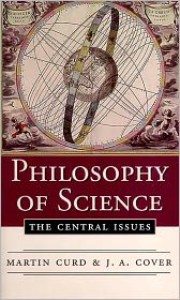Philosophy of Science: The Central Issues
 I would say this book would be one of my top 5 books (or lectures) I have ever read (or listened to). I would strongly recommend it to every one. It's taught me a new way to consider the world. Every single writer of science fiction or science books should be aware of the concepts in this book before they write their book. They don't have to necessarily come out in favor of one position but they have to aware of the issues that exist within the philosophy of science.
I would say this book would be one of my top 5 books (or lectures) I have ever read (or listened to). I would strongly recommend it to every one. It's taught me a new way to consider the world. Every single writer of science fiction or science books should be aware of the concepts in this book before they write their book. They don't have to necessarily come out in favor of one position but they have to aware of the issues that exist within the philosophy of science.Before each of the nine chapters there is a short summary of what the chapter will be about, followed by a series of 5 or 6 essays within each chapter, followed by a detailed summary at the end of the chapter on what each of the essay writers were trying to say. Sometimes, within the essay the editors would put clarification footnotes to help the reader, and each chapter is connected at a meta level.
The editors have arranged each chapter as if they are part of a ongoing dialog between various experts on a particular subtopic of philosophy of science. Each chapter follows a pattern similar to this: the first essay will state the thesis, the next essay will amplify the thesis, the next one will give the antithesis, and the last will give some kind of synthesis often telling you why the moderate approach is the best or sometimes it will restate the thesis and show why it is the best way to approach the topic. As the reader is progressing through the chapter, the reader will think the points being made in the essay are overwhelmingly true and they become completely convinced of that view point, until the next essay comes along and they think that is the only way to think about the problem. Fortunately, the editors will then do a summary and give an overall best way to think about the problems.
Within the best parts of philosophy and when it is presented in its best way, philosophy never gives good answers, but, rather gives good questions. So often, we create "convenient fictions" (or as one of the essays said 'facons de Parler' (always use the French instead of the English so everyone knows your pretentious)). The important thing is to understand the question and understand that there can be multiple ways of considering the ontological nature of the way to understand the question under consideration.
After having read this book, I now know Grue is my favorite color, all living Pegasus are green, that blue pen in front of your desk is evidence for all crows being black, explaining something doesn't mean it is explained away, ad hoc theories make it difficult to separate science from pseudoscience, the double slit experiment violates the mutually exclusive rule of logic, and science is always underdetermined (the facts we have can always be explained by multiple theories).
I liked all the chapters. Of all the essays there was only one that frustrated me. That was in the Bayesian chapter and one of the authors used a piece of mathematical notation I was not familiar with and within the text they didn't define the term. Though, that chapter on Bayesian math was well worth reading because it gave a splendid overview of how to think about the problem. BTW, why is Bayesian math so important in the philosophy of science? Because it's the only reasonable way to discount that your blue pen is evidence for all crows being black.
The used first edition of this book should be available for less than 12 dollars delivered to the home. The other thing I really liked about this book within the text there was a whole lot of science explained in the essays.
i







